新版新概念英语第二册课后练习答案
新概念英语第二册课后习题答案详解和单元测试答案(全)
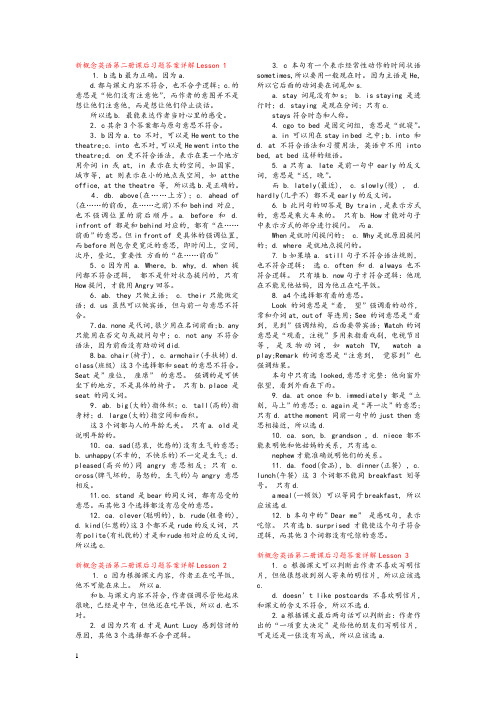
新概念英语第二册课后习题答案详解Lesson 11. b选b最为正确。
因为a.d.都与课文内容不符合,也不合乎逻辑;c.的意思是“他们没有注意他”,而作者的意图并不是想让他们注意他,而是想让他们停止谈话。
所以选b. 最能表达作者当时心里的感受。
2.c其余3个答案都与原句意思不符合。
3.b因为a. to 不对,可以是He went to the theatre;c. into 也不对,可以是He went into the theatre;d. on更不符合语法,表示在某一个地方用介词in 或at, in 表示在大的空间,如国家,城市等,at 则表示在小的地点或空间,如atthe office, at the theatre 等, 所以选b.是正确的。
4.db. above(在……上方);c. ahead of (在……的前面,在……之前)不和behind 对应,也不强调位置的前后顺序。
a. before 和 d. infront of 都是和behind对应的,都有“在……前面”的意思。
但in front of 更具体的强调位置,而before则包含更宽泛的意思,即时间上,空间,次序,登记,重要性方面的“在……前面”5.c因为用 a. Where, b. why, d. when 提问都不符合逻辑,都不是针对状态提问的,只有How提问,才能用Angry回答。
6.ab. they 只做主语; c. their只能做定语;d. us 虽然可以做宾语,但与前一句意思不符合。
7.da. none是代词,很少用在名词前面;b. any 只能用在否定句或疑问句中;c. not any 不符合语法,因为前面没有助动词did.8.ba. chair(椅子), c. armchair(手扶椅) d. class(班级) 这3个选择都和seat的意思不符合。
Seat是”座位,座席”的意思。
强调的是可供坐下的地方,不是具体的椅子。
新概念英语第二册课后练习答案lesson1
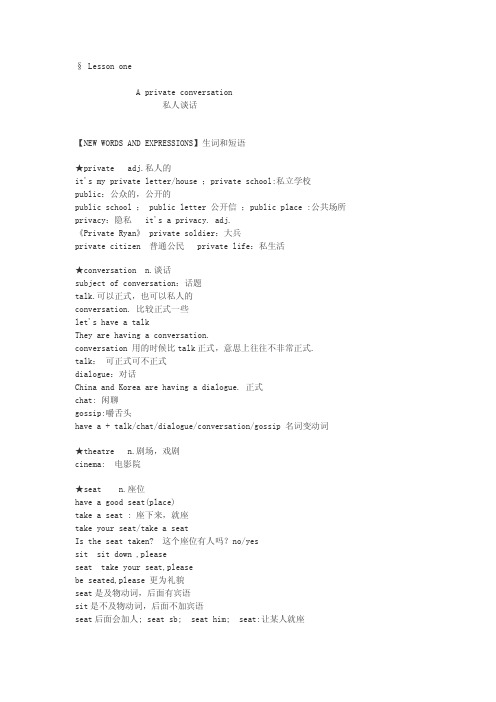
§Lesson oneA private conversation私人谈话【NEW WORDS AND EXPRESSIONS】生词和短语★private adj.私人的it's my private letter/house;private school:私立学校public:公众的,公开的public school;public letter公开信;public place:公共场所privacy:隐私it's a privacy.adj.《Private Ryan》private soldier:大兵private citizen普通公民private life:私生活★conversation n.谈话subject of conversation:话题talk.可以正式,也可以私人的conversation.比较正式一些let's have a talkThey are having a conversation.conversation用的时候比talk正式,意思上往往不非常正式.talk:可正式可不正式dialogue:对话China and Korea are having a dialogue.正式chat:闲聊gossip:嚼舌头have a+talk/chat/dialogue/conversation/gossip名词变动词★theatre n.剧场,戏剧cinema:电影院★seat n.座位have a good seat(place)take a seat:座下来,就座take your seat/take a seatIs the seat taken?这个座位有人吗?no/yessit sit down,pleaseseat take your seat,pleasebe seated,please更为礼貌seat是及物动词,后面有宾语sit是不及物动词,后面不加宾语seat后面会加人;seat sb;seat him;seat:让某人就座sit he is sitting there.you seat him;〖语法精粹〗4.When all those present(到场者)_D_he began his lecture.(重点题)A.sitB.setC.seatedD.were seaedsit,sit down;seat,be seated;take a seat★play n.戏★loudly adv.大声的★angry adj.生气的cross=angry;I was angry.He was cross.annoyed:恼火的;I was annoyed.I was angry/cross.I was very angry.be blue in the face;I am blue in the face.★angrily adv.生气的副词修饰动词★attention n.注意Attention,please.请注意pay attention:注意pay attention to:对什么注意You must pay attention to that gril.pay a little attention:稍加注意pay much attention:多加注意pay more attention:更多注意pay no attention:不用注意★bear(bore,borne)v.容忍bear,standI can't bear/stand youendure:忍受,容忍put up with:忍受I got divorced.I could not put up with himbear/stand/endure忍受的极限在加大put up with=bear=standbear n.熊white bearbear hog:热情(热烈)的拥抱give sb a bear hug★business n.事business man:生意人do business:做生意go to some place on business:因公出差I went to Tianjin on business.thing可以指事情,也可以指东西It's my business私人事情it's none of your business★rudely adv.无礼地,粗鲁地rude adj.【TEXT】Last week I went to the theatre.I had a very good seat.The play was very interesting.I did not enjoy it.A young man anda young woman were sitting behind me.They were talking loudly.I got very angry.I could not hear the actors.I turnedround.I looked at the man and the woman angrily.They did not pay any attention. In the end,I could not bear it.I turnedround again."I can't hear a word!"I said angrily."It's none of your business,"the young man said rudely."This is a private conversation!"参考译文上星期我去看戏。
新概念英语第二册课后练习答案lesson30(大全)
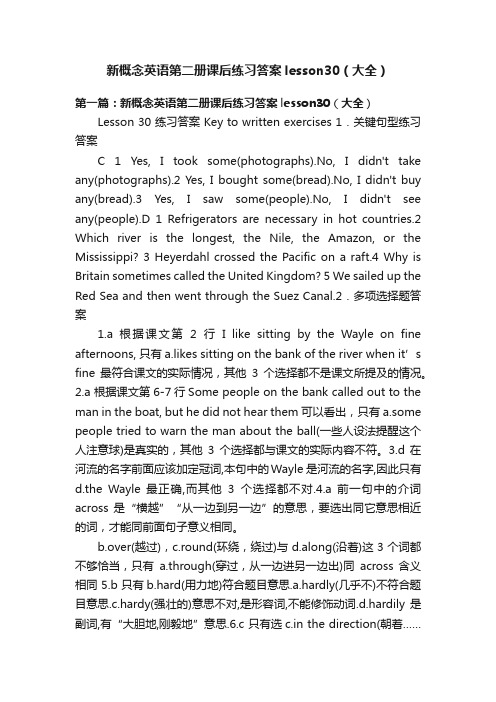
新概念英语第二册课后练习答案lesson30(大全)第一篇:新概念英语第二册课后练习答案lesson30(大全)Lesson 30 练习答案 Key to written exercises 1.关键句型练习答案C 1 Yes, I took some(photographs).No, I didn't take any(photographs).2 Yes, I bought some(bread).No, I didn't buy any(bread).3 Yes, I saw some(people).No, I didn't see any(people).D 1 Refrigerators are necessary in hot countries.2 Which river is the longest, the Nile, the Amazon, or the Mississippi? 3 Heyerdahl crossed the Pacific on a raft.4 Why is Britain sometimes called the United Kingdom? 5 We sailed up the Red Sea and then went through the Suez Canal.2.多项选择题答案1.a 根据课文第2行I like sitting by the Wayle on fine afternoons, 只有a.likes sitting on the bank of the river when it’s fine 最符合课文的实际情况,其他3个选择都不是课文所提及的情况。
2.a 根据课文第6-7行Some people on the bank called out to the man in the boat, but he did not hear them 可以看出,只有a.some people tried to warn the man about the ball(一些人设法提醒这个人注意球)是真实的,其他3个选择都与课文的实际内容不符。
新概念英语第二册课后习题答案

新概念英语第二册课后习题答案新概念英语第二册课后习题答案(精选8篇)新概念英语作为一套世界闻名的英语教程,以其全新的教学理念,有趣的课文内容和全面的技能训练,深受广大英语学习者的欢迎和喜爱。
为了方便同学们的学习,店铺为大家整理了新概念英语第二册课后习题答案,希望为大家的新概念英语学习提供帮助!新概念英语第二册课后习题答案篇11. b根据课文第2-3行I have been trying to get my new room in order. This has not been easy because I own over a thousand books 可以看出只有b. he is finding it difficult to get his room in order 与课文的实际情况相符,其他3个选择都不符合故事所描述的情景。
2. c根据课文第9-10行‘This is the prettiest carpet I have ever seen,’ she said, 可以判断出只有c. the books make a nice carpet 是作者的妹妹的真实想法,其他3个选择都与课文的内容不符,也不是他妹妹所认为的。
3. c只有c. is still working 是正确的,因为前半句用的是现在完成进行时,表示到现在为止动作还在继续进行,所以后半句应该用现在进行时,才能使句子的时态协调一致。
其他3个选择都不能与前半句的时态相配。
4. aa. make it tidy (把它收拾整齐);b. keep it tidy (保持整洁);c. make order 不合乎习惯用法,意思也讲不通;d. keep order (维持秩序)。
只有a. 最符合题目意思,因为make it tidy 与前一句中的get his room in order 意思相同,所以选a.5. ba. a small enough 不合乎语法,不能说a small enough room,可以是 the room is small enough.b. a fairly small(相当小的),c. a terribly small(极小的),d. a much smaller(更加小的),4个选择中只有b 是正确的,因为b中的fairly 同前一句的rather(相当)意义相同,所以b是对的。
新概念英语第二册课后习题答案全

新概念英语第二册课后习题答案全一、练习册第1课至第10课课后习题答案1. Lesson 1: A Private ConversationAnswer Key:1. Yes, he did.2. He asked the woman to change her seat.3. She replied that she was in the middle.2. Lesson 2: Breakfast or Lunch?Answer Key:1. He wanted to buy a newspaper.2. He ordered breakfast.3. He thought it was too early for lunch.3. Lesson 3: Please Send Me a CardAnswer Key:1. He was in a small village.2. He sent a telegram to his wife.3. He was in a hospital.4. Lesson 4: An Exciting TripAnswer Key:1. They were in a bus.2. They were going to a village.3. They had a wonderful trip.5. Lesson 5: No Wrong Numbers1. He was waiting for a phone call.2. He was waiting for his uncle.3. He received a wrong number.6. Lesson 6: Percy ButtonsAnswer Key:1. He was an old man.2. He collected old coins.3. He had a valuable coin.7. Lesson 7: Too LateAnswer Key:1. They were late for the meeting.2. They missed the train.3. They had to take a taxi.8. Lesson 8: The Best and the WorstAnswer Key:1. He was a good swimmer.2. He was the best swimmer in the pool.3. He was the worst swimmer in the pool. Answer Key:1. He was a famous actor.2. He was in a small town.3. He was recognized a young man.10. Lesson 10: Not for Jazz1. He was a famous musician.2. He played the piano.3. He was not for jazz.二、练习册第11课至第20课课后习题答案11. Lesson 11: One Good Turn Deserves Another Answer Key:1. He helped an old lady.2. She helped him find his way.3. He was grateful to her.12. Lesson 12: Ask Me No QuestionsAnswer Key:1. He was a writer.2. He wrote a book about his adventures.3. He was very modest.13. Lesson 13: Going on HolidayAnswer Key:1. They were going on holiday.2. They were going to the seaside.3. They had a wonderful time.14. Lesson 14: Do You Speak English?Answer Key:1. He was a tourist.2. He was in a foreign country.3. He spoke English.15. Lesson 15: Good NewsAnswer Key:1. He was a doctor.2. He had good news for his patient.3. The patient was cured.16. Lesson 16: A Polite RequestAnswer Key:1. He was a customer.2. He wanted to buy a new car.3. He asked the salesman for help.17. Lesson 17: Across the ChannelAnswer Key:1. He was a swimmer.2. He swam across the English Channel.3. He was very tired.18. Lesson 18: Once a WeekAnswer Key:1. He was a doctor.2. He visited his patients once a week.3. He was very busy.19. Lesson 19: Sold OutAnswer Key:1. He was a customer.2. He wanted to buy a ticket.3. The ticket was sold out.20. Lesson 20: One Man in a BoatAnswer Key:1. He was a fisherman.2. He was alone in a boat.3. He caught a lot of fish.。
(完整版)新概念英语第二册课后答案(全部)
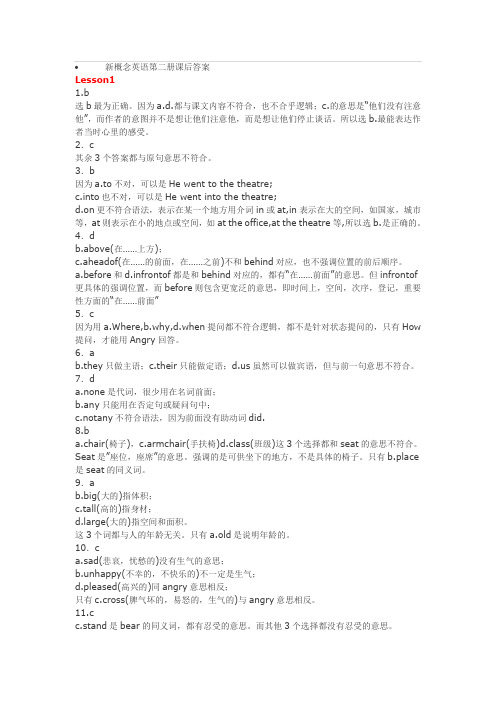
•新概念英语第二册课后答案Lesson11.b选b最为正确。
因为a.d.都与课文内容不符合,也不合乎逻辑;c.的意思是“他们没有注意他”,而作者的意图并不是想让他们注意他,而是想让他们停止谈话。
所以选b.最能表达作者当时心里的感受。
2.c其余3个答案都与原句意思不符合。
3.b因为a.to不对,可以是He went to the theatre;c.into也不对,可以是He went into the theatre;d.on更不符合语法,表示在某一个地方用介词in或at,in表示在大的空间,如国家,城市等,at则表示在小的地点或空间,如at the office,at the theatre等,所以选b.是正确的。
4.db.above(在……上方);c.aheadof(在……的前面,在……之前)不和behind对应,也不强调位置的前后顺序。
a.before和d.infrontof都是和behind对应的,都有“在……前面”的意思。
但infrontof 更具体的强调位置,而before则包含更宽泛的意思,即时间上,空间,次序,登记,重要性方面的“在……前面”5.c因为用a.Where,b.why,d.when提问都不符合逻辑,都不是针对状态提问的,只有How 提问,才能用Angry回答。
6.ab.they只做主语;c.their只能做定语;虽然可以做宾语,但与前一句意思不符合。
7.da.none是代词,很少用在名词前面;b.any只能用在否定句或疑问句中;c.notany不符合语法,因为前面没有助动词did.8.ba.chair(椅子),c.armchair(手扶椅)d.class(班级)这3个选择都和seat的意思不符合。
Seat是”座位,座席”的意思。
强调的是可供坐下的地方,不是具体的椅子。
只有b.place 是seat的同义词。
9.ab.big(大的)指体积;c.tall(高的)指身材;rge(大的)指空间和面积。
新概念英语第二册课后答案

新概念英语第二册课后答案篇一: 新概念英语第二册课后练习lesson14新概念英语第二册课后习题答案详解Lesson 14练习答案Key to written exercises1. 关键句型练习答案A 1 I drove on to the next town after I had left a small village.2 I said good morning to him in French as soon as he had got into the car.3 I had nearly reached the town, when the young man said:‘Do you speak English?’C 1 After she had written the letter, she went to the post office.2 After he had had dinner, he went to the cinema.3 When I had fastened my seat belt, the plane took off.4 We did not disturb him until he had finished work.5 As soon as he had left the room, I turned on the radio.6 He had been very ill before he died.D 1 regretted2 had begun/ began3 arrived2. 难点练习答案1 Except for2 both of3 Apart from4 asked…ask for5 neither of…asked3. 多项选择题答案1.b按照课文第3行.stoppe.an.h.aske.m.fo..lift.只有b.h.wante..freerid.i.th.ca.最符合课文内容,而其他3个选择都与课文内容不符合。
新概念英语第二册全册课后习题答案详解及单元测试答案
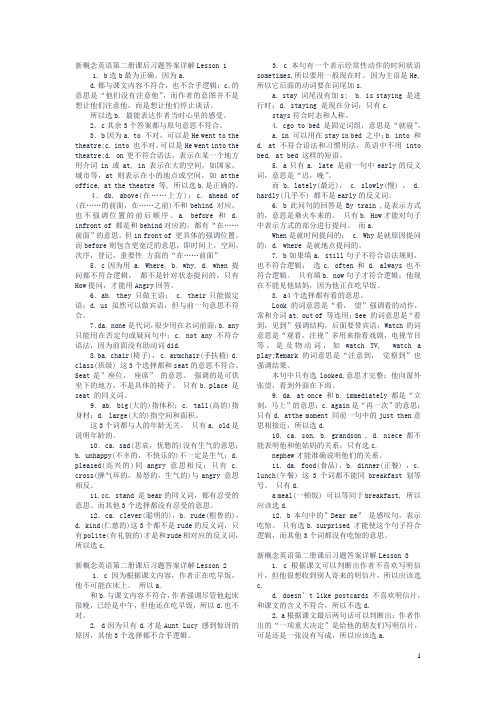
新概念英语第二册课后习题答案详解Lesson 11. b选b最为正确。
因为a.d.都与课文内容不符合,也不合乎逻辑;c.的意思是“他们没有注意他”,而作者的意图并不是想让他们注意他,而是想让他们停止谈话。
所以选b. 最能表达作者当时心里的感受。
2.c其余3个答案都与原句意思不符合。
3.b因为a. to 不对,可以是He went to the theatre;c. into 也不对,可以是He went into the theatre;d. on更不符合语法,表示在某一个地方用介词in 或at, in 表示在大的空间,如国家,城市等,at 则表示在小的地点或空间,如atthe office, at the theatre 等, 所以选b.是正确的。
4.db. above(在……上方);c. ahead of (在……的前面,在……之前)不和behind 对应,也不强调位置的前后顺序。
a. before 和 d. infront of 都是和behind对应的,都有“在……前面”的意思。
但in front of 更具体的强调位置,而before则包含更宽泛的意思,即时间上,空间,次序,登记,重要性方面的“在……前面”5.c因为用 a. Where, b. why, d. when 提问都不符合逻辑,都不是针对状态提问的,只有How提问,才能用Angry回答。
6.ab. they 只做主语; c. their只能做定语;d. us 虽然可以做宾语,但与前一句意思不符合。
7.da. none是代词,很少用在名词前面;b. any 只能用在否定句或疑问句中;c. not any 不符合语法,因为前面没有助动词did.8.ba. chair(椅子), c. armchair(手扶椅) d. class(班级) 这3个选择都和seat的意思不符合。
Seat是”座位,座席”的意思。
强调的是可供坐下的地方,不是具体的椅子。
新概念英语第二册课后习题答案详解(整理打印版)
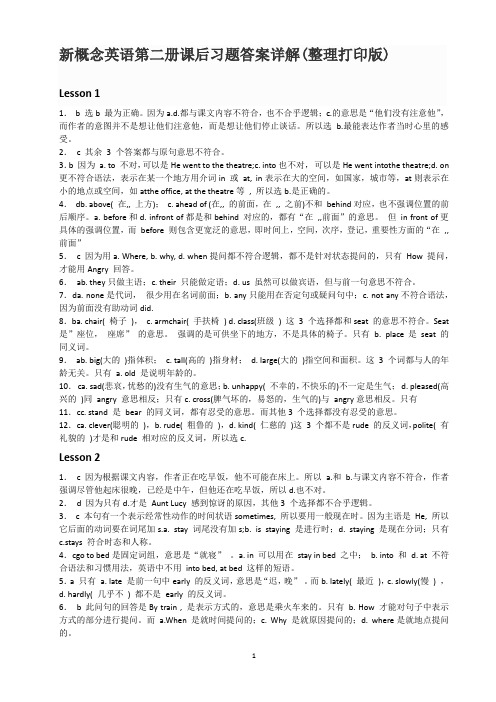
新概念英语第二册课后习题答案详解(整理打印版)Lesson 11.b 选b 最为正确。
因为a.d.都与课文内容不符合,也不合乎逻辑;c.的意思是“他们没有注意他”,而作者的意图并不是想让他们注意他,而是想让他们停止谈话。
所以选 b.最能表达作者当时心里的感受。
2.c 其余3 个答案都与原句意思不符合。
3.b 因为a. to 不对,可以是He went to the theatre;c. into也不对,可以是He went intothe theatre;d. on 更不符合语法,表示在某一个地方用介词in 或at, in表示在大的空间,如国家,城市等,at则表示在小的地点或空间,如atthe office, at the theatre等, 所以选b.是正确的。
4.db. above( 在,, 上方);c. ahead of (在,, 的前面,在,, 之前)不和behind对应,也不强调位置的前后顺序。
a. before和d. infront of都是和behind 对应的,都有“在,,前面”的意思。
但in front of更具体的强调位置,而before 则包含更宽泛的意思,即时间上,空间,次序,登记,重要性方面的“在,, 前面”5.c 因为用a. Where, b. why, d. when提问都不符合逻辑,都不是针对状态提问的,只有How 提问,才能用Angry 回答。
6.ab. they只做主语;c. their 只能做定语;d. us 虽然可以做宾语,但与前一句意思不符合。
7.da. none是代词,很少用在名词前面;b. any只能用在否定句或疑问句中;c. not any不符合语法,因为前面没有助动词did.8.ba. chair( 椅子),c. armchair( 手扶椅) d. class(班级) 这3 个选择都和seat 的意思不符合。
Seat 是”座位,座席”的意思。
强调的是可供坐下的地方,不是具体的椅子。
新概念英语第二册课后练习答案
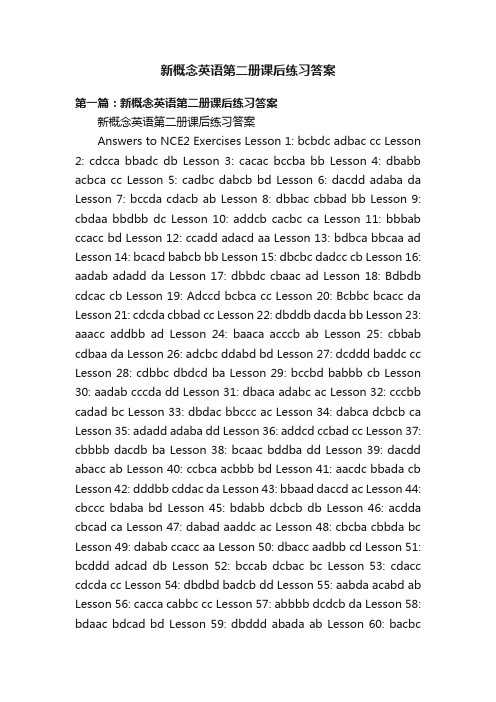
新概念英语第二册课后练习答案第一篇:新概念英语第二册课后练习答案新概念英语第二册课后练习答案Answers to NCE2 Exercises Lesson 1: bcbdc adbac cc Lesson 2: cdcca bbadc db Lesson 3: cacac bccba bb Lesson 4: dbabb acbca cc Lesson 5: cadbc dabcb bd Lesson 6: dacdd adaba da Lesson 7: bccda cdacb ab Lesson 8: dbbac cbbad bb Lesson 9: cbdaa bbdbb dc Lesson 10: addcb cacbc ca Lesson 11: bbbab ccacc bd Lesson 12: ccadd adacd aa Lesson 13: bdbca bbcaa ad Lesson 14: bcacd babcb bb Lesson 15: dbcbc dadcc cb Lesson 16: aadab adadd da Lesson 17: dbbdc cbaac ad Lesson 18: Bdbdb cdcac cb Lesson 19: Adccd bcbca cc Lesson 20: Bcbbc bcacc da Lesson 21: cdcda cbbad cc Lesson 22: dbddb dacda bb Lesson 23: aaacc addbb ad Lesson 24: baaca acccb ab Lesson 25: cbbab cdbaa da Lesson 26: adcbc ddabd bd Lesson 27: dcddd baddc cc Lesson 28: cdbbc dbdcd ba Lesson 29: bccbd babbb cb Lesson 30: aadab cccda dd Lesson 31: dbaca adabc ac Lesson 32: cccbb cadad bc Lesson 33: dbdac bbccc ac Lesson 34: dabca dcbcb ca Lesson 35: adadd adaba dd Lesson 36: addcd ccbad cc Lesson 37: cbbbb dacdb ba Lesson 38: bcaac bddba dd Lesson 39: dacdd abacc ab Lesson 40: ccbca acbbb bd Lesson 41: aacdc bbada cb Lesson 42: dddbb cddac da Lesson 43: bbaad daccd ac Lesson 44: cbccc bdaba bd Lesson 45: bdabb dcbcb db Lesson 46: acdda cbcad ca Lesson 47: dabad aaddc ac Lesson 48: cbcba cbbda bc Lesson 49: dabab ccacc aa Lesson 50: dbacc aadbb cd Lesson 51: bcddd adcad db Lesson 52: bccab dcbac bc Lesson 53: cdacc cdcda cc Lesson 54: dbdbd badcb dd Lesson 55: aabda acabd ab Lesson 56: cacca cabbc cc Lesson 57: abbbb dcdcb da Lesson 58: bdaac bdcad bd Lesson 59: dbddd abada ab Lesson 60: bacbcbabac ad Lesson 61: bacca dcabb dd Lesson 62: addcd ccbda db Lesson 63: dbaab ddacd ca Lesson 64: ccccb bccab bb Lesson 65: adbbc aadcc bd Lesson 66: cbaad aabab ba Lesson 67: daddd dbbad dd Lesson 68: bbcdb bbccc aa Lesson 69: abcbb ddaab cd Lesson 70: dbccd bcacd dc Lesson 71: bdbbc cdbbc ba Lesson 72: acadb accdb ad Lesson 73: cadac dadaa db Lesson 74: baccd cacbc ab Lesson 75: cabdb abbdd cc Lesson 76: dbdaa bbacb dd Lesson 77: acabc dddaa ba Lesson 78: acbbc acbab ca Lesson 79: bdcca dbada ac Lesson 80: cbdad cadcc db Lesson 81: daadb bdcbd bd Lesson 82: abadc cdaac bd Lesson 83: bacca bcbcd ab Lesson 84: ccabd cccda cd Lesson 85: ddbab abdbb dc Lesson 86: bcabb bdcab bc Lesson 87: cdcda ccada ad Lesson 88: cbbcc abbcc cb Lesson 89: aadad dadbd db Lesson 90: bccca bcbad dd Lesson 91: dbcbc dbbcb cb Lesson 92: bcdcb abbad ca Lesson 93: cdbac ccdcb db Lesson 94: abcba dacda bc Lesson 95: dabad cdcac dc Lesson 96: dccba dcdab cb第二篇:新概念英语第二册课后练习答案lesson11(范文)新概念英语第二册课后习题答案详解Lesson 11练习答案 Key to written exercises 1.关键句型练习答案 A a he is now working(1.2)b he gets(1.3);he always borrows(1.3);never pays it back(1.4)c came in…worked(11.2-2);T ony saw(1.4);came and sat(1.4);I asked him(1.6);he gave me(1.7);Tony said(1.8)d He has never borrowed(1.5);I have never borrowed(1.7)e I was having(1.1);he was eating(1.6)C 1 gets…got 2 have not had was writing…talked/ were t alking 4 am typing passed/ were passingD The Taj Mahal was built…after he became/ had become ruler, his wife…died.The Taj Mahal was built in her honour.Experts were called in…The Taj Mahal, which was begun in 1632and(was)completed in 1654, cost a fortune…it has been visited by… 2.难点练习答案 aA 1 The officer ordered the men to fire at the enemy.2 He wants his wife to wear this dress.3 She wants us to explain it.I cannot allow him to enter the room.B(sample sentences)1 He asked me to help him.2 We preferred her to stay at home.3 He taught me to speak English.My mother wished me to collect the laundry.5 Do you want her to visit you? b salary 2 lent…salary/ wages 3 borrowed 4 wages 5 wages 3.多项选择题答案1.b根据课文第6-7行I asked him to lend me twenty pounds… he gave me the moneyimmediately, 应该选b.而其他3个选择都不符合课文内容。
新概念英语第二册课后习题答案详解及单元测试答案(全)
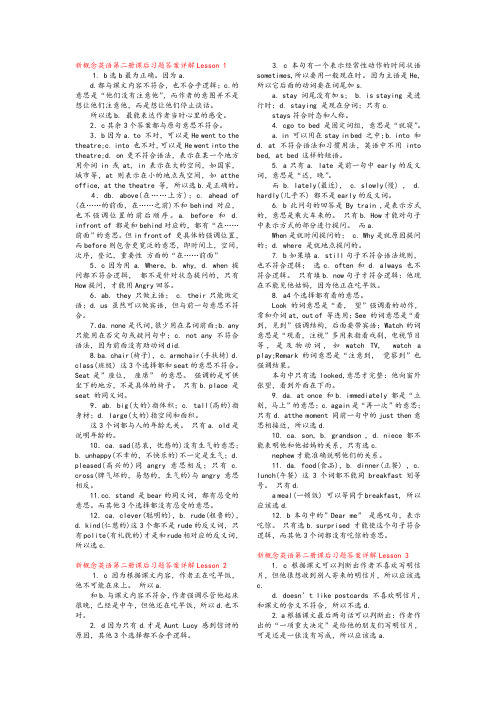
新概念英语第二册课后习题答案详解Lesson 11. b选b最为正确。
因为a.d.都与课文内容不符合,也不合乎逻辑;c.的意思是“他们没有注意他”,而作者的意图并不是想让他们注意他,而是想让他们停止谈话。
所以选b. 最能表达作者当时心里的感受。
2.c其余3个答案都与原句意思不符合。
3.b因为a. to 不对,可以是He went to the theatre;c. into 也不对,可以是He went into the theatre;d. on更不符合语法,表示在某一个地方用介词in 或at, in 表示在大的空间,如国家,城市等,at 则表示在小的地点或空间,如atthe office, at the theatre 等, 所以选b.是正确的。
4.db. above(在……上方);c. ahead of (在……的前面,在……之前)不和behind 对应,也不强调位置的前后顺序。
a. before 和 d. infront of 都是和behind对应的,都有“在……前面”的意思。
但in front of 更具体的强调位置,而before则包含更宽泛的意思,即时间上,空间,次序,登记,重要性方面的“在……前面”5.c因为用 a. Where, b. why, d. when 提问都不符合逻辑,都不是针对状态提问的,只有How提问,才能用Angry回答。
6.ab. they 只做主语; c. their只能做定语;d. us 虽然可以做宾语,但与前一句意思不符合。
7.da. none是代词,很少用在名词前面;b. any 只能用在否定句或疑问句中;c. not any 不符合语法,因为前面没有助动词did.8.ba. chair(椅子), c. armchair(手扶椅) d. class(班级) 这3个选择都和seat的意思不符合。
Seat是”座位,座席”的意思。
强调的是可供坐下的地方,不是具体的椅子。
新概念英语第二册课后练习答案(1-20)

新概念英语第二册课后练习答案(1~20课)课)Lesson 1 1.关键句型练习.关键句型练习A I (1) got (2) very angry (3) . I (1) could not hear (2) the actors (3) . I (1) turned round (2) . I (1) looked at (2) the man and the woman (3) angrily (4) . They (1) did not pay (2) any a en on (3) . In the end (6), I (1) could not bear (2) it (3). I (1) turned round (2) again (6) . zI (1) can't hear (2) a word (3)! { I (1) said (2) angrily (4) . zIt (1) is (2) none of your business (3) , { the young man (1) said (2) rudely (4) . zThis (1) is (2) a private conversa on (3)!{ B 1 I enjoyed the film yesterday. 2 I listened to the news carefully. 3 The man played the piano well. 4 The children played games quietly in their room yesterday. 5 He opened the door quietly. 6 He le immediately. 7 He planted a tree in the corner of the garden. 8 He read the le er quickly in his office before lunch. 9 I borrowed a book from the library this morning. 10 The cook spoilt the soup. 11 We stay at home on Sundays. 12 There are a lot of people at the bus stop. 13 The li le boy ate greedily an apple in the kitchen this morning. 14 She draws beau fully. 15 I like music very much. 16 They built a new school in our village last year. 17 The match ended at four o'clock. 18 She received a le er from her brother last week. 2.多项选择题答案.多项选择题答案1 b 2 c 3 b 4 d 5 c 6 a 7 d 8 b 9 a 10 c 11 c 12 c Lesson 2 2.难点练习答案难点练习答案1 What a wonderful garden(this is) ! 2 What a surprise( this is) ! 3 What a lot of trouble he is causing! 4 What wonderful actors (they are) ! 5 What a hard-working woman (she is) ! 6 What a tall building (it is) ! 7 What a terrible film (it is) ! 8 What a clever boy you are! 9 What a pre y girl (she is) ! 10 What a strange guy (he is) ! 3.多项选择题答案.多项选择题答案1 c 2 d 3 c 4 c 5 a 6 b 7 b 8 a 9 d 10 c 11d 12 b Lesson 3 1.关键句型练习题.关键句型练习题A went (1.1)Õvisited (1.2) Õsat(1.2) Õtaught(1.2)Õtaught(1.2)ÕlentÕlentÕlentÕread(1.3) Õread(1.3) Õdid not understandÕunderstandÕthought (1.4)Õthought (1.4)Õpassed (1.5) Õdid not send(1.5) ÕmadeÕmadeÕgo up (1.6) Õgo up (1.6) Õbought (1.7) Õspent(1.7) Õdid not write(1.8)C ...Roy died last year…le me…spent a lot of money…bought one or two…never went to the cinema…stayed at home…listened to music…o en lent CDs…they kept them…lost many CDs… 2.难点练习题.难点练习题1 He paid some money to the shopkeeper. 2 He handed the prize to me. 3 The waiter brought the man a bo le of beer. 4 He sold me all his books. 5 The shop assistant found me some curtain material. 6 He did a big favour for me. 7 She showed her new hat to her husband. 8 She promised the finder a reward. 9 He gave some advice to his son. 10 His uncle le some money to/ for him. 11 He is teaching us English. 12 I bought you this bunch of flowers. 13 Bring me that book please. 14 He offered a cigare e to me. 15 Read the first paragraph to me. 16 I've ordered you some soup. 17 I owe a lot of money to him. 18 Pass your father the mustard. 3.多项选择.多项选择1c 2a 3c 4a 5d 6b 7c 8c 9b 10a 11b 12b Lesson 4 1.关键句型答案.关键句型答案A 1 I have just had breakfast. 2 He has been in prison for six months. 3 The police have not caught the thief yet. 4 You have (already) asked that ques on three mes (already). 5 Have you ever been to Switzerland? 6 I have never been to Switzerland. 7 He is a wonderful runner. He has broken two records so far . 8 I haven't seen George lately . C 1 He has just le the house . 2 He has just had breakfast . 3 She has just wri en a le er . 4 My sister has just turned on the radio . 5 My mother has just made the bed . 6 She has just bought a new hat. D 1 He hasn't washed the dishes yet . 2 She hasn't made the beds yet . 3 He hasn't combed his hair yet . 4 She hasn't swept the carpet yet . 5 We haven't read A MacbethByet . E 1 Have you seen the new play at AThe GlobeByet ? 2 Have you taken your holidays yet ? 3 Have you read this book yet ? 4 Have you done your homework yet ? 5 Have you finished your work yet ? 2.难点练习答案.难点练习答案1 received 2 received 3 took 4 taken 5 take 3.多项选择答案.多项选择答案1d 2b 3a 4b 5b 6a 7c 8b 9c 10a 11c 12c Lesson 5 1.关键句型答案.关键句型答案A What happened: carried (1.4 ) ; covered (1. 5 ) What has happened: has just bought (1.1) ; has just bought (11.3-4);has sent(1.6);has begun(1.8) C 1 What did you buy 8 ? 2 he has never lent 8 3 Have you burnt 8 ? 4 He fought 8 5 They have already le . 6 When did you lose 8 ? 7 Did you listen 8 ? 8 We have just won 8 2难点练习答案难点练习答案A 1 On the way 2 in the way 3 By the way 4 in this/a way 5 in the way B 1 There is a spare wheel in the back of the car. 2. I always always go go go on on excursions excursions in in my my spare spare spare me. me. 3 ýHave ýHave you you you any any any old old clothes clothes to to to spare? spare? spare? þhe þhe asked. 4 The guest slept in our spare room. 5 ýSpare me!þbegged the prisoner. 3.多项选择答案.多项选择答案1c 2a 3d 4b 5c 6d 7a 8b 9c 10b 11a 12d Lesson 6 1.关键句型答案.关键句型答案A Some meat, a desk, some tobacco, a n of beans, a comb, acity, a/ some cloth, some oil, a bo le of beer, a day, a word, a student, some sugar, some rain, an orange, a/ some rubber D (sample answers) 1 I found an old coin in the garden. 2 I put some sugar in my tea. 3 I cut some wood for a/ the fire. 4 I bought a newspaper yesterday. 5 I made some coffee. 6 I like the curtains in this room. 2.难点练习答案.难点练习答案A 1 out 2 over 3 off 4 at B 1 knocked him out 2 knock off 3 knocked 20% off the price 3.多项选择答案.多项选择答案1 d 2 a 3 c 4 d 5 d 6 a 7 d 8 a 9 b 10 a 11d 12 a Lesson7 1.关键句型答案.关键句型答案A detec ves were wai ng(1.1); They were expec ng(1.2); detec ves were wai ng(1.5); others were wai ng(1.6);two detec ves were keeping guard(11.7-8) B 1 When the plane arrived, some of the detec ves were wai ng inside the main building while others were wai ng on the airfield. 2 When two of the detec ves opened the parcel, two others were keeping guard at the door . C (sample answers) 1 I was ge ng into my bath when you telephoned me. 2 I was reading Hamlet when you saw me in the library this morning. 3 I was saying that you must see the new film when you interruped me. D 1 was leavingKarrived 2 worked/ was workingKwas si ng/ sat3 was walkingKmet 4 was readingKheard 5 was preparingKset/ was se ng 6 droppedKspoke 2.难点练习答案.难点练习答案1 He gave all his books away. 2 She woke the children up early this morning. 4 They cut the king's head off. 5 Put your hat and coat on. 7 Help me to li this table up. 8 Take your shoes off and put your slippers on. 11 They have pulled the old building down.12 Make your mind up. 14 She threw all those old newspapers away. 3.多项选择答案.多项选择答案1 b 2 c 3 c 4 d 5 a 6 c 7 d 8 a 9 c 10 b 11a 12 b Lesson 8 1.关键句型练习答案.关键句型练习答案A 1 Mary's handwri ng is worse than Jane's. 2 Caroline's handwri ng is worse than Mary's and Jane's. 3 Caroline's dress is/ was more expensive than Jane's. 4 Mary's dress is/ was more expensive than Jane's and Caroline's. B óhas the most beau ful garden in our townó[The Nicest Garden Compe on\ó garden is larger than Joe'sóworks harder than Joe and grows more flowers and vegetablesógarden is more interes ngófor the worst garden in the town! D 1 in 2 of 3 of 4 in 2.难点练习答案.难点练习答案A 1 believes 2 was 3 tries B Sentences 2, 3 and 5 3.多项选择答案.多项选择答案1 d 2 b 3 b 4 a 5 c 6 c 7 b 8 b 9 a 10 d 11b 12 b Lesson 9 1.关键句型练习答案.关键句型练习答案A 1 We went to the Town Hall on Wednesday evening/ New Year's Eve. 2 The clock would strike twelve in twenty minutes me. 3 The clock stopped at five to twelve. B 1 in 2 On 3 during/ in 4 in 5 at 6 on…in 7 in 8 at…in 9 un l C (sample answers) 1 The match will begin at 3 o'clock. 2 They bought their house in 1980. 3 The shop is closed from one ll two. 4 The children went to school in the morning. 5 He'll finish school in two years' me. 6 Let's go for a walk in the evening. 7 He went to church on Sunday. 2.难点练习答案.难点练习答案A 1 No, I haven't any/ have no money. 2 No, I didn't go anywhere/ went nowhere in the holidays. 3 No, I didn't buy anything/ bought nothing this morning. 4 No, there wasn't anybody/ was nobody present when the accident happened. B He has no hobbies. He goes nowhere. He sees nobody. He is interested in nothing----except food! 3.多项选择题答案.多项选择题答案5 a 6 b 4 a 5 a 6 b 2 b 3 d 3 d 4 a 1 b 2 b 11 d 12 c 12 c 10 b 11 d 9 b 10 b 7 b 8 d 8 d 9 b Lesson 10 1.关键句型练习答案.关键句型练习答案A 1 Our old musical instrument is called a clavichord. 2 It was made in Germany. 3 It is kept in the living room. 4 It was bought many years ago. 5 It was damaged recently. 6 Two of the strings were broken. 7 My father was shocked. 8 We aren't allowed to touch it. 9 The clavichord is being repaired. 2.难点练习答案.难点练习答案A 1 of 2 in 3 from B 1 He borrowed a record of mine. 2 She showed me a picture of John's. 3 It was an idea of hers. 4 A le er of yours was found on my desk. 5 Some friends of theirs came to see me. 3.多项选择题答案.多项选择题答案1 a 2 d 3 d 4 c 5 b 6 c 7 a 8 c 9 a 10 c 11 c 12 a Lesson 11 1.关键句型练习答案.关键句型练习答案A a he is now working (1.2) b he gets (1.3); he always borrows (1.3); never pays it back (1.4) c came inmworked (11.2-2); Tony saw (1.4); came and sat (1.4); I asked him (1.6); he gave me (1.7); Tony said (1.8) d He has never borrowed (1.5); I have never borrowed (1.7) e I was having (1.1); he was ea ng (1.6) C 1 getsmgot 2 have not had 3 was wri ngmtalked/ were talking 4 am typing 5 passed/ were passing D The Taj Mahal was builtma er he became/ had become ruler, his wifemdied. The Taj Mahal was built in her honour. Experts were called inmThe Taj Mahal, which was begun in 1632 and (was) completed in 1654, cost a fortunemit has been visited bym 2.难点练习答案.难点练习答案A 1 The officer ordered the men to fire at the enemy. 2 He wants his wife to wear this dress. 3 She wants us to explain it. 4 I cannot allow him to enter the room. B (sample sentences) 1 He asked me to help him. 2 We preferred her to stay at home. 3 He taught me to speak English. 4 My mother wished me to collect the laundry. 5 Do you want her to visit you? b 1 salary 2 lentmsalary/ wages 3 borrowed 4 wages 5 wages 3.多项选择题答案.多项选择题答案1 b 2 b 3 b 4 a 5 b 6 c 7 c 8 a 9 c 10 c 11b 12 d Lesson 12 1.关键句型练习答案A will sail (1.1); shall meet (1.2); will be (1.3); will set out (11.4-5); shall have(1.5); shall see (1.5); shall say (1.6);will be (1.6); will take part (1.7) C I shall go to the theatre Reg and I shall see the first performance the producer will give a short speech. He will speak to The play will be very people will enjoy it very much. 2.难点练习答案.难点练习答案1 He is not back yet. He will be back in ten minutes. 2 A new play is on at the Globe Theatre. 3 When the concert was over, We went home. 4 They will set out/ off very early tomorrow morning. (Here be off is also possible.) 5 You can't take the exam yet. You are not up to it. 6 He will be away from home for two months. 7 She swam across the English Channel and set up a new world record. 3.多项选择题答案.多项选择题答案1 c 2 c 3 a 4 d 5 d 6 a 7 d 8 a 9 c 10 d 11 a 12 a Lesson 13 1.关键句型练习答案.关键句型练习答案A will be arriving (1.2); will be coming (1.3); will be mee ng (1.4); will be singing (1.5); will be staying (1.6); will be trying (1.8) C 1 I'll be ironing the clothes. 2 The train will be arriving in a few minutes. 3 We'll be seeing you in the morning. 4 We'll be watching the match. 5 He'll be correc ng exercise books. 2.难点练习答案.难点练习答案1 It's George's. 2 It's Jean's. 3 It's that woman's. 4 I like Keats' poetry best. 5 They're the children's. 6 They're the soldiers'. 7 I'll leave in six hours me. 8 There was a hundred pounds' worth of damage. 3多线选择答案多线选择答案1 b 2 d 3 b 4 c 5 a 6 b 7 b 8 c 9 a 10 a 11a 12 d Lesson 14 1.关键句型练习答案.关键句型练习答案A 1 I drove on to the next town a er I had le a small village. 2 I said good morning to him in French as soon as he had got into the car. 3 I had nearly reached the town, when the young man said: BDo you speak English? C 1 A er she had wri en the le er, she went to the post office. 2 A er he had had dinner, he went to the cinema. 3 When I had fastened my seat belt, the plane took off. 4 We did not disturb him un l he had finished work. 5 As soon as he had le the room, I turned on the radio. 6 He had been very ill before he died. D 1 regre ed 2 had begun/ began 3 arrived 2.难点练习答案.难点练习答案1 Except for 2 both of 3 Apart from 4 askedlask for 5 neither oflasked 3.多项选择答案.多项选择答案1 b 2 c 3 a 4 c 5 d 6 b 7 c 8 b 9 c 10 b 11 b 12 b Lesson 15 1. 关键句型练习答案关键句型练习答案A 1a The secretary told me that Mr. Harmsworth would see me. bcMr. Harmsworth will see you. d 2 a Mr. Harmsworth said that business was very bad. b cBusiness is very bad.d 3 a Mr. Harmsworth told me that the firm could not afford to pay such large salaries. b cThe firm cannot afford to pay such large salaries. d B 1 told would come/would be coming 2 said(had) cut 3 told had never played 4 did he sayhad done/would do 5 did he tell(had) bought/would buy 6 saidcould not 7 said(had) worked 8 toldwrote/writes/had never wri en 9 did you saywere/had been 10 saidwould wait 2.难点练习答案.难点练习答案1 study 2 office 3 nervous 4 afford 5 irritable 3.多线选择答案.多线选择答案1d 2b 3c 4b 5c 6d 7a 8d 9c 10c 11c 12b Lesson 16 1.关键句型练习答案.关键句型练习答案A The word if has been used four mes. C 1 rains 2 will never pass 3 is 4will get 5 enjoys 6 is D$if I listen to the radio$If I do something wrong, don't shout at me. If the house is un dy, don't blame me. If you want me to do something, don't forget to say.please/. If I am playing a nice game, don't send me to bed. If I ask for something$If it is cold don't put the cat out$ 2.难点练习答案.难点练习答案1 pay a en on 2 remind 3 are knocking 4 look a er 5 Remember me 3.多项选择答案.多项选择答案1a 2a 3d 4a 5b 6a 7d 8a 9d 10d 11d 12a Lesson 17 1.关键句型练习答案.关键句型练习答案A She must be(1.1); Jennifer will have to take(1.3); she must appear(1.4); she had to wear(11.5-6); it must be terrible(11.7-8) C 1 You must/will have to see a doctor. 2 Must you/Do you have to make so much noise? 3 She said we must/had to/would have to stay here. 4 I must/have to have some help. 8 I've had to go out last night. 2.难点练习答案.难点练习答案A 1 in the posi on of 2 because 3 At the me when B 1 grow 2 suit 3 costume 4 dress 3.多项选择答案.多项选择答案1d 2b 3b 4d 5c 6c 7b 8a 9a 10c 11a 12d Lesson 18 1.关键句型练习答案.关键句型练习答案A 1 I looked for my bag a er I had had lunch at a village pub. 2 I had le my bag on a chair beside the door. 3 The landlord asked me:5Did you have a good meal?6 4 I answered:5I can't pay the bill because I haven't got my bag.6 5 The dog had taken the bag into the garden. C Sentences 2, 3, 5, 7, 8, 10, 11 2难点练习答案难点练习答案A 1 back 2 away 3 in 4 in B 1 Besides 2 beside 3多线选择答案多线选择答案1b 2d 3b 4d 5b 6c 7d 8c 9a 10c 11c 12b Lesson 19 2难点练习答案难点练习答案1 I have not seen 2 There aren't 3 He does notyou are 4 She didn't tellshe hadn't 5 I shan't stay 6 He won't dohe's told 7 When will I 8 What have youYou have broken 9 He isHe has just come 10 I can't understandhe has not 11 You must not believe 12 I was notYou were not 13 That man has been 14 They had not seen 3多线选择答案多线选择答案1a 2d 3c 4c 5d 6b 7c 8b 9c 10a 11c 12c Lesson 20 1关键句型练习答案关键句型练习答案A Fishing(1.1); catching(11.1-2); catching(1. 3); having spent(1.5); fishing(1.6); fishingˆ si ng(1.8); doing (1.9) C 1 he went out of the restaurant without paying the bill. 2 She bought a pair of boots instead of ge ng a pair of shoes. 3 She was afraid of spending the night alone. 4 A er hearing/having heard the news, she fainted. 5 Think carefully before answering my ques on. 6 On seeing the plane coming towards me, I dashed for cover. 2难点练习答案难点练习答案1realized 2It'sˆunderstandˆits 3exci ng 4interes ng 5exci ng 6interested 3多项选择答案多项选择答案1b 2c 3b 4b 5c 6b 。
新概念英语第二册课后答案

新概念英语第二册课后答案Lesson 1: The rainforestExercise 1:1.Once it rains in the forest, it takes a long time for the sunlight to reach the ground.2.Rainforests are usually found near the equator.rge numbers of plants and animals are found in rainforests.4.The forest is very thick due to the many trees.5.The rainforest will die if people do not stop cutting down trees.Exercise 2:1.The forest is very thick due to the many trees.2.Rainforests are usually found near the equator.rge numbers of plants and animals are found in rainforests.4.The rainforest will die if people do not stop cutting down trees.5.Once it rains in the forest, it takes a long time for the sunlight to reach the ground.Lesson 2: A private conversationExercise 1:1.The weather was very bad yesterday.2.The woman referred to the difficulties she faced in her private life.3.The woman asked the man to keep the conversation private.4.The woman was unhappy with her partner’s behavior.5.The woman didn’t want anyone else to hear their conversation.Exercise 2:1.The woman referred to the difficulties she faced in her private life.2.The woman asked the man to keep the conversation private.3.The woman didn’t want anyone else to hear their conversation.4.The woman was unhappy with her partner’s behavior.5.The weather was very bad yesterday.Lesson 3: Can I help you?Exercise 1:1.The man asked the woman if he could help her with her luggage.2.The woman said that her case was too heavy for her to carry.3.The man offered to carry the woman’s case for her.4.The woman thanked the man for his assistance.5.The man asked if he could help the woman carry her case.Exercise 2:1.The woman said that her case was too heavy for her to carry.2.The man asked the woman if he could help her with her luggage.3.The man offered to carry the woman’s ca se for her.4.The woman thanked the man for his assistance.5.The man asked if he could help the woman carry her case.Lesson 4: The fourth floorExercise 1:1.The man asked the woman if she lived on the third floor.2.The woman told the man that she lived on the seventh floor.3.The woman said that the lift was out of order and she had to use the stairs.4.The man said that he also did not like climbing stairs.5.The woman said that she wouldn’t mind living on the third floor.Exercise 2:1.The woman told the man that she lived on the seventh floor.2.The woman said that the lift was out of order and she had to use the stairs.3.The woman said that she wouldn’t mind living on the third floor.4.The man asked the woman if she lived on the third floor.5.The man said that he also did not like climbing stairs. Lesson 5: Not the same anymoreExercise 1:1.The man and woman used to be good friends.2.The man said that the woman had changed a lot.3.The woman asked the man if he still wanted to be friends.4.The man replied that he didn’t think they could be friends anymore.5.The woman seemed upset by the man’s response. Exercise 2:。
新概念英语第二册课后习题答案详解(96课全)
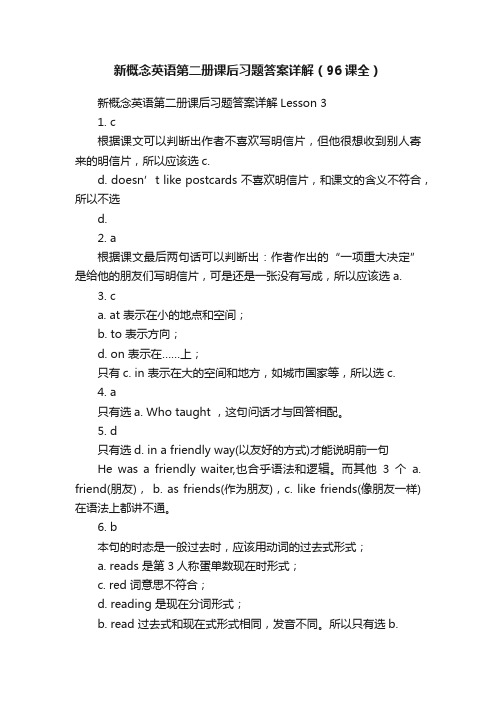
新概念英语第二册课后习题答案详解(96课全)新概念英语第二册课后习题答案详解Lesson 31. c根据课文可以判断出作者不喜欢写明信片,但他很想收到别人寄来的明信片,所以应该选c.d. doesn’t like postcards 不喜欢明信片,和课文的含义不符合,所以不选d.2. a根据课文最后两句话可以判断出:作者作出的“一项重大决定”是给他的朋友们写明信片,可是还是一张没有写成,所以应该选a.3. ca. at 表示在小的地点和空间;b. to 表示方向;d. on 表示在……上;只有c. in 表示在大的空间和地方,如城市国家等,所以选c.4. a只有选a. Who taught ,这句问话才与回答相配。
5. d只有选d. in a friendly way(以友好的方式)才能说明前一句He was a friendly waiter,也合乎语法和逻辑。
而其他3个a. friend(朋友), b. as friends(作为朋友),c. like friends(像朋友一样)在语法上都讲不通。
6. b本句的时态是一般过去时,应该用动词的过去式形式;a. reads 是第3人称蛋单数现在时形式;c. red 词意思不符合;d. reading 是现在分词形式;b. read 过去式和现在式形式相同,发音不同。
所以只有选b.7. ca. the hole 词意思不对;b. the ball 和 d. all of 不合乎习惯用法;英语中不用the all day, all of day 这样一来的短语。
只有选c. all 才能使句中的词组all day 同前一句中的the whole day 意思相同。
8. c句中的waiter 是“饭店服务员”的意思,他通常在饭店工作,而不在a. public garden(公园),b. shop(商店),d. private house(私宅) 工作,所以选c. restaurant.9. b只有b. borrowed 才与前一句中的lent相对应,而其他3个选择都不是。
(完整版)新概念英语第二册课后习题答案详解
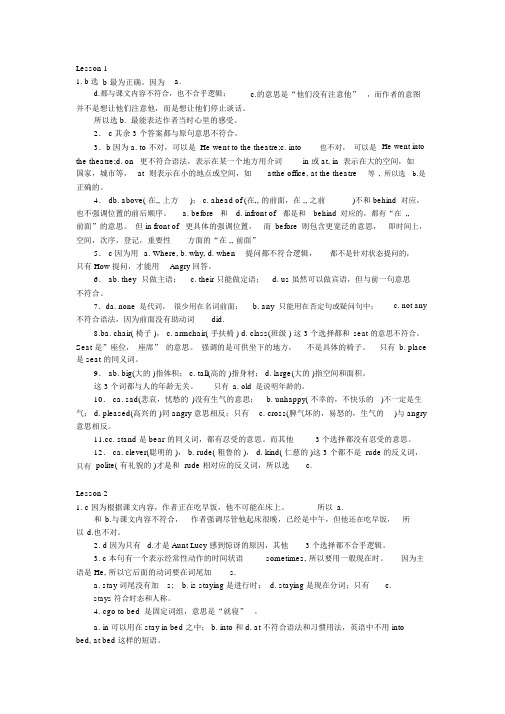
Lesson 11. b 选 b 最为正确。
因为 a.d.都与课文内容不符合,也不合乎逻辑; c.的意思是“他们没有注意他”,而作者的意图并不是想让他们注意他,而是想让他们停止谈话。
所以选 b. 最能表达作者当时心里的感受。
2. c 其余 3 个答案都与原句意思不符合。
3.b 因为 a. to 不对,可以是 He went to the theatre;c. into也不对,可以是He went into the theatre;d. on更不符合语法,表示在某一个地方用介词in 或 at, in 表示在大的空间,如国家,城市等,at 则表示在小的地点或空间,如atthe office, at the theatre等,所以选 b.是正确的。
4. db. above( 在,, 上方); c. ahead of (在,, 的前面,在 ,, 之前)不和 behind 对应,也不强调位置的前后顺序。
a. before和 d. infront of都是和behind对应的,都有“在,,前面”的意思。
但 in front of更具体的强调位置,而before则包含更宽泛的意思,即时间上,空间,次序,登记,重要性方面的“在 ,, 前面”5. c 因为用 a. Where, b. why, d. when提问都不符合逻辑,都不是针对状态提问的,只有 How 提问,才能用Angry 回答。
6. ab. they只做主语; c. their 只能做定语; d. us 虽然可以做宾语,但与前一句意思不符合。
7.da. none是代词,很少用在名词前面; b. any只能用在否定句或疑问句中; c. not any 不符合语法,因为前面没有助动词did.8.ba. chair( 椅子 ), c. armchair( 手扶椅 ) d. class(班级 ) 这 3 个选择都和seat 的意思不符合。
Seat 是”座位,座席” 的意思。
新概念英语第二册课后答案(全部) 超级详细的哦!!
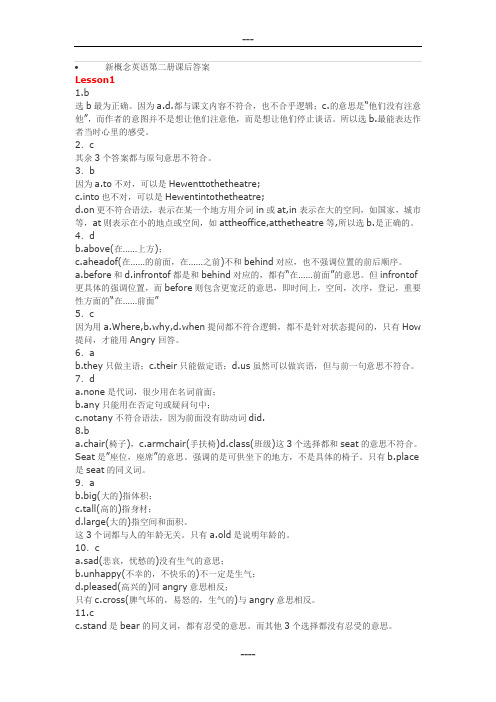
•新概念英语第二册课后答案Lesson11.b选b最为正确。
因为a.d.都与课文内容不符合,也不合乎逻辑;c.的意思是“他们没有注意他”,而作者的意图并不是想让他们注意他,而是想让他们停止谈话。
所以选b.最能表达作者当时心里的感受。
2.c其余3个答案都与原句意思不符合。
3.b因为a.to不对,可以是Hewenttothetheatre;c.into也不对,可以是Hewentintothetheatre;d.on更不符合语法,表示在某一个地方用介词in或at,in表示在大的空间,如国家,城市等,at则表示在小的地点或空间,如attheoffice,atthetheatre等,所以选b.是正确的。
4.db.above(在……上方);c.aheadof(在……的前面,在……之前)不和behind对应,也不强调位置的前后顺序。
a.before和d.infrontof都是和behind对应的,都有“在……前面”的意思。
但infrontof 更具体的强调位置,而before则包含更宽泛的意思,即时间上,空间,次序,登记,重要性方面的“在……前面”5.c因为用a.Where,b.why,d.when提问都不符合逻辑,都不是针对状态提问的,只有How 提问,才能用Angry回答。
6.ab.they只做主语;c.their只能做定语;虽然可以做宾语,但与前一句意思不符合。
7.da.none是代词,很少用在名词前面;b.any只能用在否定句或疑问句中;c.notany不符合语法,因为前面没有助动词did.8.ba.chair(椅子),c.armchair(手扶椅)d.class(班级)这3个选择都和seat的意思不符合。
Seat是”座位,座席”的意思。
强调的是可供坐下的地方,不是具体的椅子。
只有b.place 是seat的同义词。
9.ab.big(大的)指体积;c.tall(高的)指身材;rge(大的)指空间和面积。
新概念英语第二册全册课后习题答案详解及单元测试答案【精编】

新概念英语第二册课后习题答案详解Lesson 11. b选b最为正确。
因为a.d.都与课文内容不符合,也不合乎逻辑;c.的意思是“他们没有注意他”,而作者的意图并不是想让他们注意他,而是想让他们停止谈话。
所以选b. 最能表达作者当时心里的感受。
2.c其余3个答案都与原句意思不符合。
3.b因为a. to 不对,可以是He went to the theatre;c. into 也不对,可以是He went into the theatre;d. on更不符合语法,表示在某一个地方用介词in 或at, in 表示在大的空间,如国家,城市等,at 则表示在小的地点或空间,如atthe office, at the theatre 等, 所以选b.是正确的。
4.db. above(在……上方);c. ahead of (在……的前面,在……之前)不和behind 对应,也不强调位置的前后顺序。
a. before 和d. infront of 都是和behind对应的,都有“在……前面”的意思。
但in front of 更具体的强调位置,而before则包含更宽泛的意思,即时间上,空间,次序,登记,重要性方面的“在……前面”5.c因为用a. Where, b. why, d. when 提问都不符合逻辑,都不是针对状态提问的,只有How提问,才能用Angry回答。
6.ab. they 只做主语;c. their只能做定语;d. us 虽然可以做宾语,但与前一句意思不符合。
7.da. none是代词,很少用在名词前面;b. any 只能用在否定句或疑问句中;c. not any 不符合语法,因为前面没有助动词did.8.ba. chair(椅子), c. armchair(手扶椅) d. class(班级) 这3个选择都和seat的意思不符合。
Seat是”座位,座席”的意思。
强调的是可供坐下的地方,不是具体的椅子。
新概念英语第二册课后答案(全部)
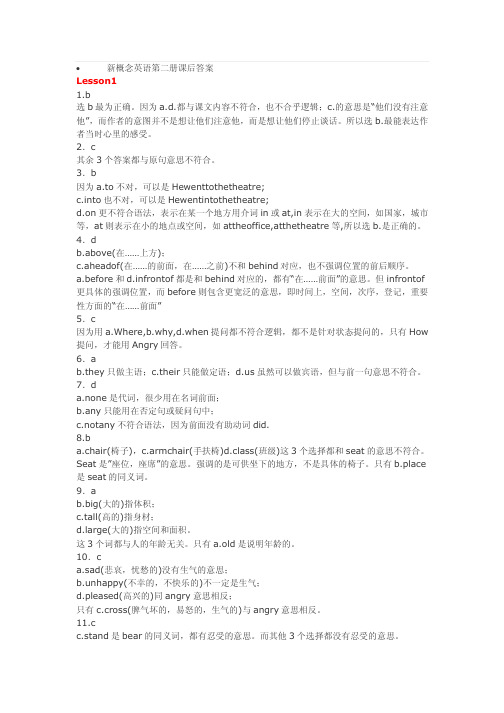
。词名饰修前词名在用能不�性词词动和词名有)束结�后最(dne.b a.01
。同相思意 yadelohweht 的中句一前同 yadlla 组词的中句使能才 lla.c 选有只 。语短的来一样这 yadfolla,yadllaeht 用不中语英�法用惯习乎合不 folla.d 和 llabeht.b �对不思意词 eloheht.a c.7
.b 选以所,时成完在现是 neebehsah.b 有只�时 去过般一是 ehsaw.d�法语合符不,neeb 词分去过有没中 ehsah.c�时在现般一是 ehsi.a 。态时成完在现用该应以所�那在还他时话说为因。”久多了呆儿那在他“问是句本 b.4
。辑逻乎合且并确 正思意和态时的子句使能才.b 选�中态时成完在用以可)来以……从(ecnis.b 有只�对不思 意句本在用它是但 �中时成完来将和中时成完去过于用常 �”止为……到“间时示表以可 yb.d �时成完在现于用少很它�"……到……从"示表用连 ot 词介与常 morf.c .等 raeyenorof,shtnomxisrof 如,中时成完在用能才候时用连词的间时段一示表同有只 rof.a b.5
.a 选该应以所�成写有没张一是还是 可�片信明写们友朋的他给是”定决大重项一“的出作者作�出断判以可话句两后最文课据根 a.2
.c 选以所�等家国市城如�方地和间空的大在示表 ni.c 有只 �上……在示表 no.d �向方示表 ot.b �间空和点地的小在示表 ta.a c.3
。配相答回与才话问句这�thguatohW.a 选有只 a.4
�
只。号等划 tsafkaerb 同能不都词个 3 这)餐午(hcnul.c�)餐正(rennid.b�)品食(doof.a d.11 。系关的们他 明说确准能才 wehpen.c 选有只 �系关*姑他和他明表能不都 ecein.d,nosdnarg.b,nos.a c.01
